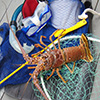Fishing Licenses
In most states, a fishing license is the most important item you will need before you can take any fish, reptiles or amphibians. In fact, most states require a license for simply catching and releasing a fish back into the water. Generally, every state has its own fishing license requirements. However, some states, such as Georgia and Alabama, share the same body of water. Therefore, they share the same license.
There are a variety of licenses to choose from, including recreational and commercial fishing license types, as well as both saltwater and freshwater options.
Find Your Section:
How to Get a Fishing License
You will need to determine whether you meet fishing license requirements before learning how to obtain a fishing license in your state. While the age requirement for a license is 13 years of age in Tennessee, you must be at least 16 years of age to obtain a fishing license in California. Furthermore, you may not even need a fishing license in your state in certain instances; for example, if you only fish on privately owned farmland or fish from a public pier.
Most states allow you to buy fishing license online. This is typically the most convenient way to purchase a license, as you can do so from the comfort of your own home. Generally, short-term licenses can easily be printed out and used for day or weeklong trips. As for annual or long-term fishing licenses, most states will allow you to print out a temporary document until you receive your official license in the mail.
Additionally, most states allow fishermen to buy fishing license credentials at designated government offices or through certified license agents. By completing the process in person, anglers can receive assistance with obtaining the proper license, and can even receive their licenses the same day.
In some states, such as Texas and Florida, anglers can also purchase a license by phone. Other states, such as Tennessee, even allow fishermen to purchase a fishing day pass or license through a mobile application.
To obtain a fishing license in your state, you most likely will need to provide a valid photo identification document to verify:
-
Your identity.
-
Your age.
-
Your state residency.
Typically, a driver's license, an official state ID card or a military ID card will satisfy the above requirement.
As for special licenses, such as disabled fishing licenses, state departments usually require additional documentation to be submitted by mail or in person. For example, you may need a certification letter from your physician if you are mobility impaired. If you are a disabled veteran, you may need to provide proof that you were honorably discharged from the U.S. military and have a service-related disability.
To learn more on how to apply for a fishing license in your state, download our comprehensive guide.
Types of Fishing Licenses
From saltwater to freshwater fishing license credentials, there is a variety of recreational fishing licenses from which to choose, for both residents and nonresidents. As for residents who fish to sell their catch for profit, there are commercial fishing license options available. The prices of these fishing licenses typically vary depending on:
-
The type of license.
-
The duration of license.
-
The applicant's residency.
-
Whether the applicant qualifies for a free or reduced-fee license.
Generally, residents fish at a lower cost than nonresidents. Additionally, there is a wide variety of licenses available for residents, including lifetime licenses.
By obtaining a lifetime fishing license, residents can avoid the increasing costs of fishing passes, and can gain fishing privileges for the remainder of their lives - by paying a one-time fee.
As for nonresidents and first-time anglers, temporary fishing license credentials are bit more ideal. Whether for a day or a weekend, usually any fishers can purchase short-term license options. However, some states may only allow nonresidents to obtain longer temporary licenses. For example, only nonresidents can obtain seven-day permits in Pennsylvania.
In addition to these licenses, there are also special licenses available to anglers that meet certain eligibility requirements. These licenses are typically available for free, or at a discounted price. You may be able to qualify for a special license if you are a:
-
Senior.
-
Veteran.
-
Native American.
-
Disabled person.
Keep in mind that you may be required to obtain additional report cards, permits and stamps, in addition to your fishing license. These additives will allow you to take certain species in specific areas.
Some states, such as Michigan, allow you to combine fishing and hunting privileges through special combination licenses.
Download our guide to find out the type of licenses available in your state, and whether or not you meet fishing license requirements.
Fishing Laws and Regulations
In addition to obtaining a valid fishing license, there are other federal and state fishing laws you must obey to partake in the sport of fishing. All states have a department that governs the rules and regulations in public waters. In Georgia, this is the Department of Natural Resources. Similarly, the Department of Environmental Conservation manages all fisheries in New York.
These departments determine and enforce several areas. These include:
-
Fishing seasons.
-
Legal fish sizes.
-
Fish bag limits.
-
Fishing gear.
-
Methods of take.
Fishing season dates are established to allow for certain species in specific bodies of water to revive their populations. Similarly, fish size limits ensure that fish have matured and spawned at least once. Ultimately, these fishing laws are put into place to prevent overfishing and certain species from becoming extinct.
Additionally, there are federal fishing regulations established by the U.S. Fish and Wildlife Service (FWS) and National Oceanic and Atmospheric Administration (NOAA) that serve to protect the nation's marine environment. Laws that drive these regulations include:
-
Magnuson-Stevens Act.
-
Endangered Species Act.
-
Marine Mammal Protection Act.
-
National Environmental Policy Act.
Some federal fishing regulations include:
-
Not being permitted to transport living creatures from one body of water to another.
-
Selling any fish caught without a commercial fishing license.
-
Buying fish caught with a sport fishing license.
Download our guide to find out more about the ocean and freshwater fishing regulations in your state.





